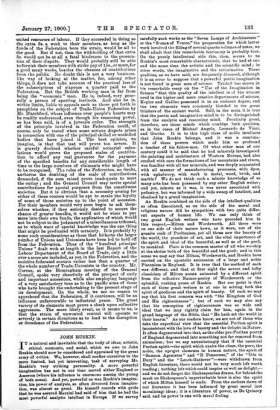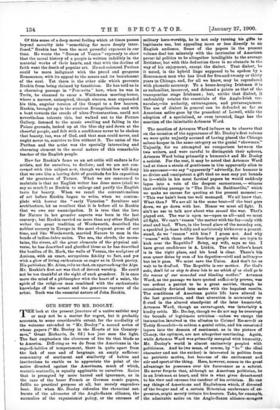JOHN RUSKIN.
IT is natural and inevitable that the body of ideas, artistic, ethical, economic, and social, which we owe to John Ruskin should now be considered and appraised by the great army of critics. We, however, shall confine ourselves to the more limited, but yet interesting, task of surveying Mr. Ruskin's very striking personality. A more powerful imagination has not in our time moved either England or America (where his influence is enormous among the young of both sexes). And yet; powerful as was Ruekin's imagine. tion, his power of analysis, so often divorced from imagina- tion, was almost as great. He himself records with pride that he was assured Mazzini had said of him that he had the most powerful analytic, intellect in Europe. If we survey carefully such works as the "Seven Lampe of Architecture" or the "Stones of Venice," the preparation for which latter work involved the filling of several quarto volumes of notes, we shall admit that this remarkable testimony is probably true. On the purely intellectual side this, then, seems to us Ruskin's most remarkable characteristic, that he had at one and the same time the artistic and the scientific mind ; in other words, the imaginative and the ratiocinative. These qualities, as we have said, are frequently divorced, although it is an error to suppose that a powerful poetic imagination is not found in great men of science. Tyndall has shown in his remarkable essay on the " Use of the Imagination in Science" that this quality of the intellect is of the utmost need in the higher and more creative departments of science. Kepler and Galileo possessed it in an eminent degree, and the two elements were commonly blended in the great thinkers of the ancient world. Still, in the main it is true that the poetic and imaginative mind is to be distinguished from the analytic and reasoning mind. Peculiarly great, therefore, are those minds which combine both qualities, as in the cases of Michael Angelo, Leonardo da Vinci, and Goethe. It is to this high class of noble intellects that John Ruskin belongs, and it was a combina- tion of these powers which made him so profound a teacher of his fellow-men. Of what other man of our century could it be said that he had minutely investigated the painting and architecture of Western Europe, had also studied with care the formations of her mountains and rivers, was familiar with all her minerals, and was deeply acquainted with all manner of manufacturing processes, with dyes, with upholstery, with work in metal, wood, brick, and marble? We do not think such a minute knowledge of so many arts has been possessed by any other English writer ; and yet, minute as it was, it was never associated with pedantry, but was informed by a wide sweep of intellect, and idealised by a grand imagination.
As Ruskin combined on the side of the intellect qualities so often dissociated, so on the side of the moral and religious nature did he sympathise with two quite differ- ent aspects of human life. We can only think of two great English writers who have preceded him in this respect,—Milton and Wordsworth. All three were on one side of their nature hewn, as it were, out of the granite rock of Puritanism, yet all three saw the beauty of the world, the grandeur of art., and the vital importance of the spirit and ideal of the beautiful, as well as of the good, to mankind. Plato is the common master of all who worship at the shrine both of the beautiful and the good ; and in this sense we may Bay that Milton; Wordsworth, and Ruskin have carried on the apostolic succession of a large and noble Platonism in England. It is true that the method of each was different, and that at first sight the severe and lofty classicism of Milton seems animated by a different spirit from the reflective Nature-poetry of Wordsworth or the splendid, rushing prose of Ruskin. Bat our point is that each of these great writers is at one in seizing both the spirit of goodness and the spirit of beauty. Of each we may say that his first concern was with " the Kingdom of God and His righteousness " ; but of each we may also say that his conception of righteousness was so wide and ideal that we may rightly claim for him, again in the grand language of the Bible, that " He bath set the world in their hearts." As our readers know, we are not of those who take the superficial view that the essential Puritan spirit is inconsistent with the love of beauty and the delight in Nature. It often degenerated into that, as the older pre-Puritan poetry of England degenerated into something not far removed from animalism ; but we say unhesitatingly that if the essential Puritan spirit—the spirit which exalts the clean, the pure, the noble, the upright elements in human nature, the spirit of "Samson Agonistes " and "Il Penseroso," of the "Ode to Duty" and the " Leech-Gatherer "—were withdrawn from English literature, there would not be very much left worth reading ; nothing left which could inspire as well as delight,— and we do not forget the Shakespearian drama, for behind the mask on Shakespeare's imperturbable brow is also the spirit of which Milton himself is made. From the earliest dawn of our literature it has been informed by great moral (not moralising) ideas ; it is a literature of power, as De Quincey said, and its power is one with moral feeling. Of this sense of a deep moral feeling which at times passes beyond morality into " something far more deeply inter- fused," Ruskin has been the most powerful exponent in our time. He wrote the " Stones of Venice" expressly to show that the moral history of a people is written indelibly in the material works of their hands, and that with the decline of faith went the death of popular art. No sad-coloured Puritan could be more indignant with the proud and gorgeous Renascence, with its appeal to the senses and its banishment of the soul. Yet there is the other side which prevents Ruskin from being claimed by fanaticism. He has told us in a charming passage in "Przeterita" how, when he was in Turin, he chanced to enter a Waldensian meeting-house, where a narrow, uninspired, though sincere, man expounded his thin, angular version of the Gospel to a few hearers. Raskin, brought up in the straitest Evangelicalism and with a bent towards the creeds of ultra-Protestantism, could not nevertheless tolerate this, but walked out to the Picture Gallery, listened to the music swelling and falling in the Palace grounds, looked up at the blue sky and down at the cheerful people, and felt with a confidence never to be shaken that beauty, too, was of God, and that man could never, and ought never to, contrive to live without it. The union of the Puritan and the artist was the specially interesting and charming element in the moral nature of this remarkable teacher of the English people.
How far Ruskin's fame as an art critic will endure is for artiste, not for ourselves, to declare; and we are not con- cerned with this subject now, though we think few will deny that we owe him a lasting debt of gratitude for his exposition of the greatness of Turner. What we are concerned to maintain is that no English writer has done more (shall we say so much P) as Ruskin to enlarge and purify the English taste for beauty. When we recall the conventionalism of art before Ruskin began to write, when we contem- plate with horror the " early Victorian " furniture and architecture, let us recollect that it is before all to Ruskin that we owe our emancipation. It is true that the love for Nature in her grander aspects was born in the last century; but Ruskin carried on more than any other English writer the great tradition of Wordsworth, described the noblest scenery in Europe in the most eloquent prose of our time, and like Wordsworth, married Nature to man in the bonds of indissoluble union. The sea, the clouds, the moun- tains, the rivers, all the great elements of the physical uni- verse, he has described and glorified these as he has described the basilica, of St. Mark, the walls of Verona, the sculpture of Amiens, with an exact, scrupulous fidelity to fact, and yet with a glow of living enthusiasm as eager as in Greek poetry. His publisher, Mr. Allen, tells us that, on approaching the Alps. Mr. Ruskin's first act was that of devout worship. He could not be too thankful at the sight of such grandeur. It is once more the mind of a philosopher with the heart of a saint, the spirit of the religious man combined with the enthusiastic knowledge of the savant and the generous rapture of the artist. Such was the essential nature of John Ruskin.



















































 Previous page
Previous page